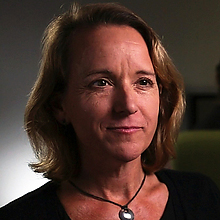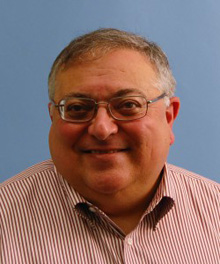About 165 registered attendees heard talks from industry leaders and UCSC faculty at the Baskin School of Engineering's Research Review Day on Thursday, October 17. The audience at the annual event included venture capitalists and researchers from Silicon Valley companies, who came to hear about the latest research developments from UCSC faculty and graduate students.
Art Ramirez, dean of the Baskin School of Engineering, noted the importance of industry interactions and partnerships in the school's research and education programs. "We view industry as owning the important problems in engineering and technology," he said.
This year's talks focused on the areas of data science, regenerative medicine, and mobile and pervasive computing. Peter Skomoroch, former data scientist at LinkedIn, gave a plenary talk on data science that emphasized the importance of the underlying concept behind all the big data hype. "When you have large amounts of data, it enables you to see patterns and do things you couldn't do with small amounts of data," he said, while cautioning against blind trust in data and algorithms.
Skomoroch described growing opportunities for data scientists, a relatively new occupation for people with the skills to build systems and develop algorithms to exploit large amounts of data. His comments were echoed later in the day in a talk by Ike Nassi, adjunct professor of computer science at UCSC and former executive vice president and chief scientist at SAP. "There is an unmet need for new approaches in data science," Nassi said. "The future is increasingly complex and difficult to predict, and we need data science to make experts more effective."
In particular, Nassi stressed the need to simplify the ever-increasing complexity of computer system architectures for handling big data. "Our overall ability to manage complexity is not increasing," he said. Machine learning approaches, using data analysis and feedback loops to improve the performance of computer systems, can help address this challenge, Nassi said.
Lise Getoor, who is joining the UCSC faculty in November as a professor of computer science, described her work in an area of machine learning called Statistical Relational Learning. "There are great opportunities to do good work and do useful things in the current era of big data, information overload, and network science," Getoor said. "There is a lot of new energy around data science at UCSC, and a lot of opportunities in research, education, and industry connections."
In the area of regenerative medicine, several talks described research at UCSC using stem cells to investigate diseases such as leukemia and breast cancer, as well as aspects of early brain development. Sofie Salama, UCSC research associate and Howard Hughes Medical Institute research specialist, is using embryonic stem cells to study brain development. Her lab has developed a method in which cortical neurons growing in a lab dish display the same features seen in the early development of the cerebral cortex. Using this assay to compare cortical development in humans versus rhesus monkeys has revealed genes and molecular pathways that may be involved in some neurological disorders.
Camilla Forsberg, associate professor of biomolecular engineering, described her lab's work on blood stem cells, aiming to make bone marrow transplants a safer and more efficient treatment option for patients with leukemias, lymphomas, and other blood disorders (see "Stem cell discovery could lead to improved bone marrow transplants").
Mobile and pervasive computing was the third focus area. Katia Obraczka, professor of computer engineering, described ongoing projects in UCSC's Internetwork Research Group to enable the Internets of the future. "In addition to the core Internet, a variety of nontraditional networks are emerging, including sensor networks, mobile networks, vehicular networks, smart homes, and smart grids," Obraczka said. "The challenges include scalability and heterogeneity. There are lots of different kinds of devices, networks, and applications, and devices can connect to different networks."
Her group's research projects include characterizing user mobility in wireless networks, deployment of sensor networks, and software-defined networking. Power consumption is a major concern for networks that rely on mobile or embedded sensors, and Matthew Guthaus, associate professor of computer engineering, discussed his work on ultra-low-power computation for mobile and embedded sensor systems.
These are just a few examples of the broad range of research projects presented at Research Review Day. More information is available online at rr.soe.ucsc.edu/2013.




